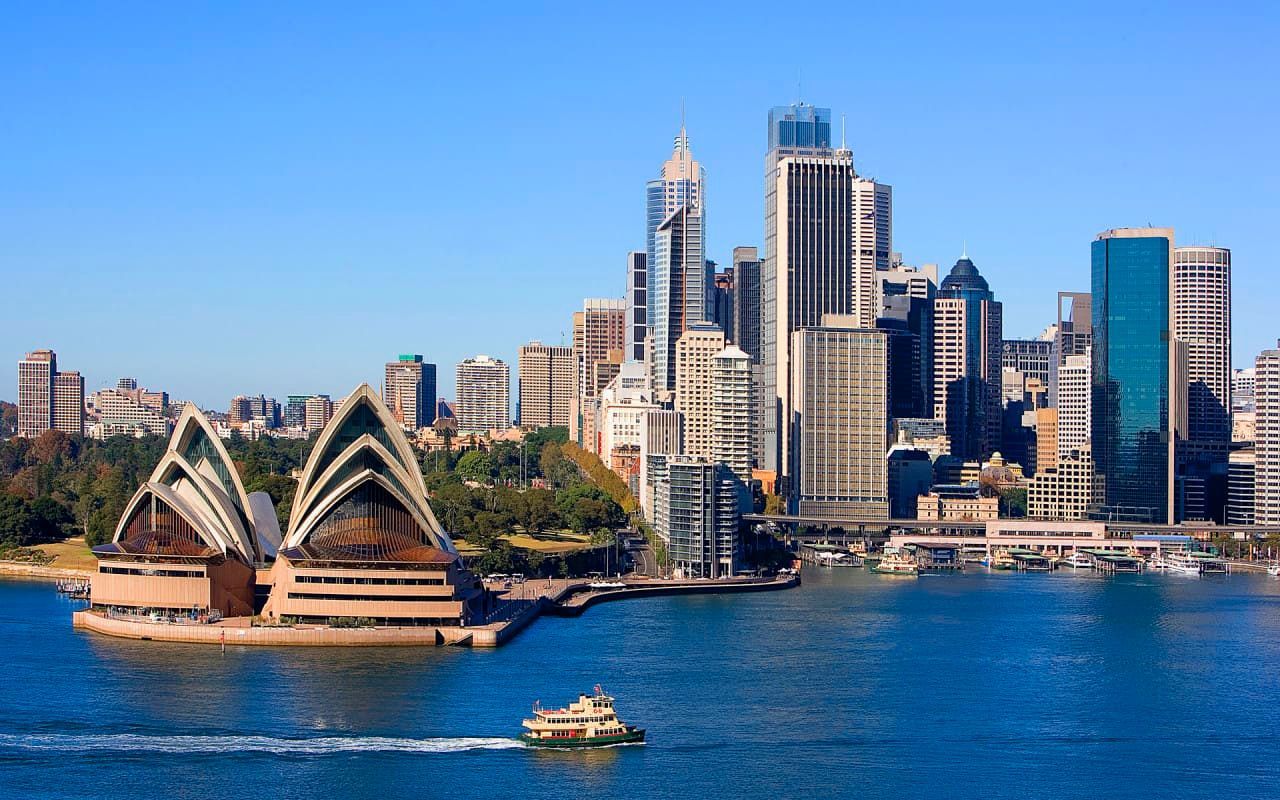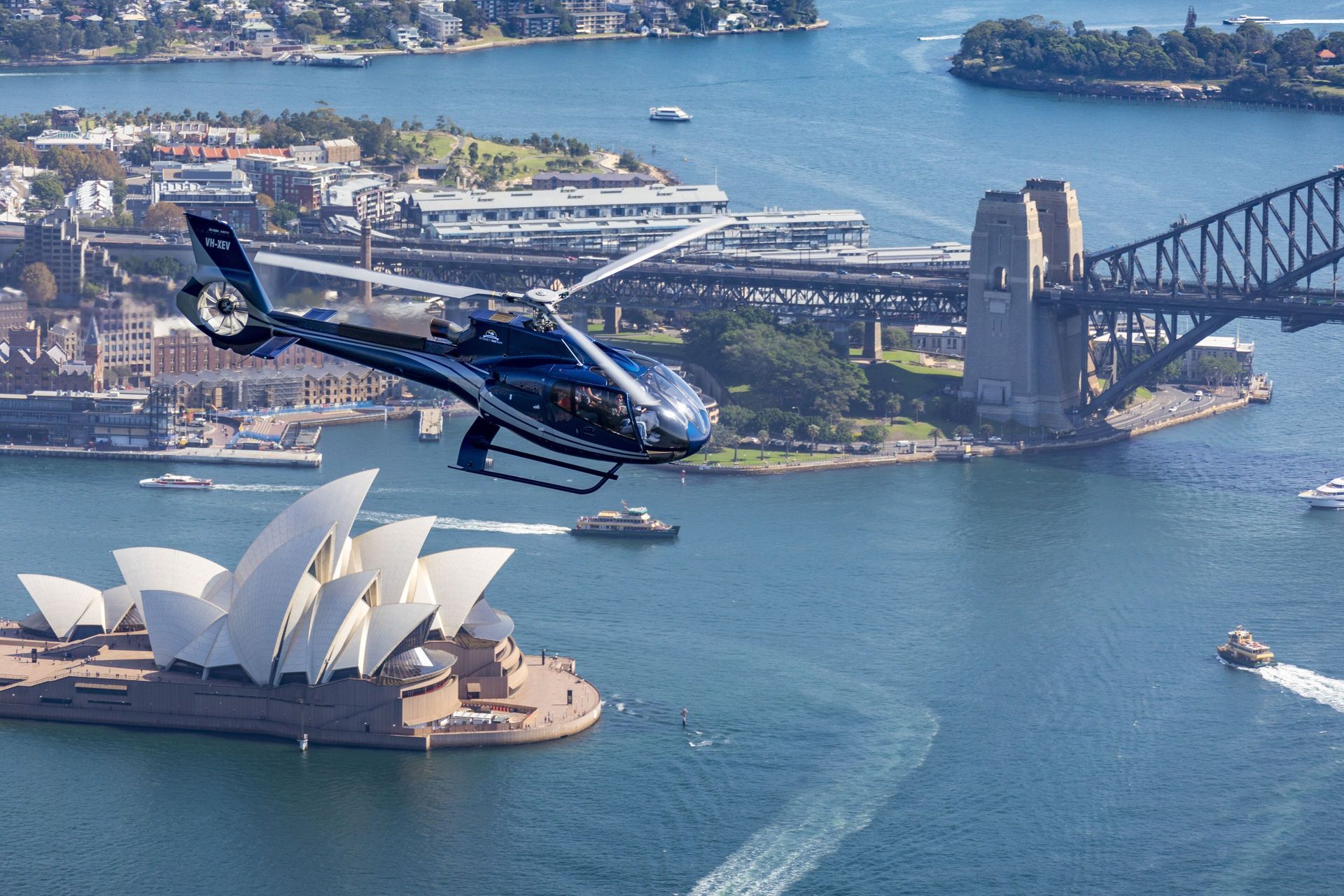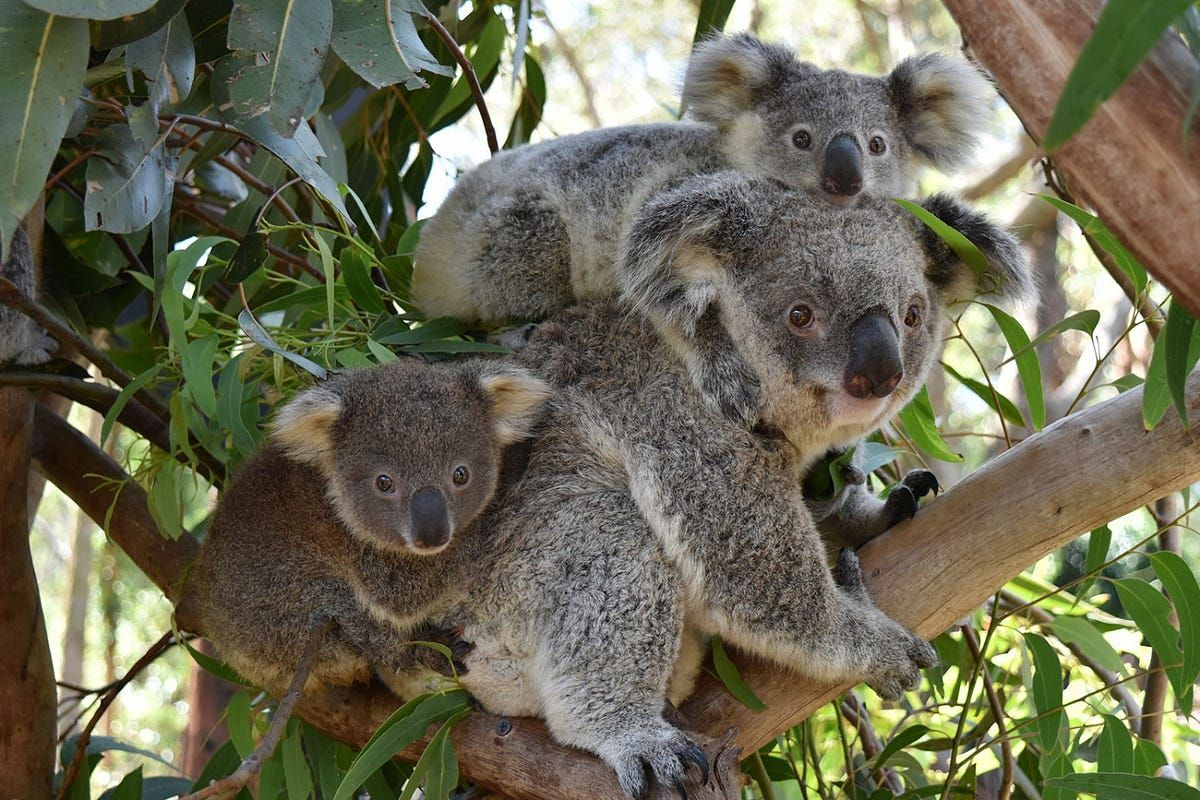To share
Experience the perfect blend of urban sophistication and natural beauty on Australia's Gold Coast. From surfing to wildlife encounters, embark on an adventure that will captivate your senses.
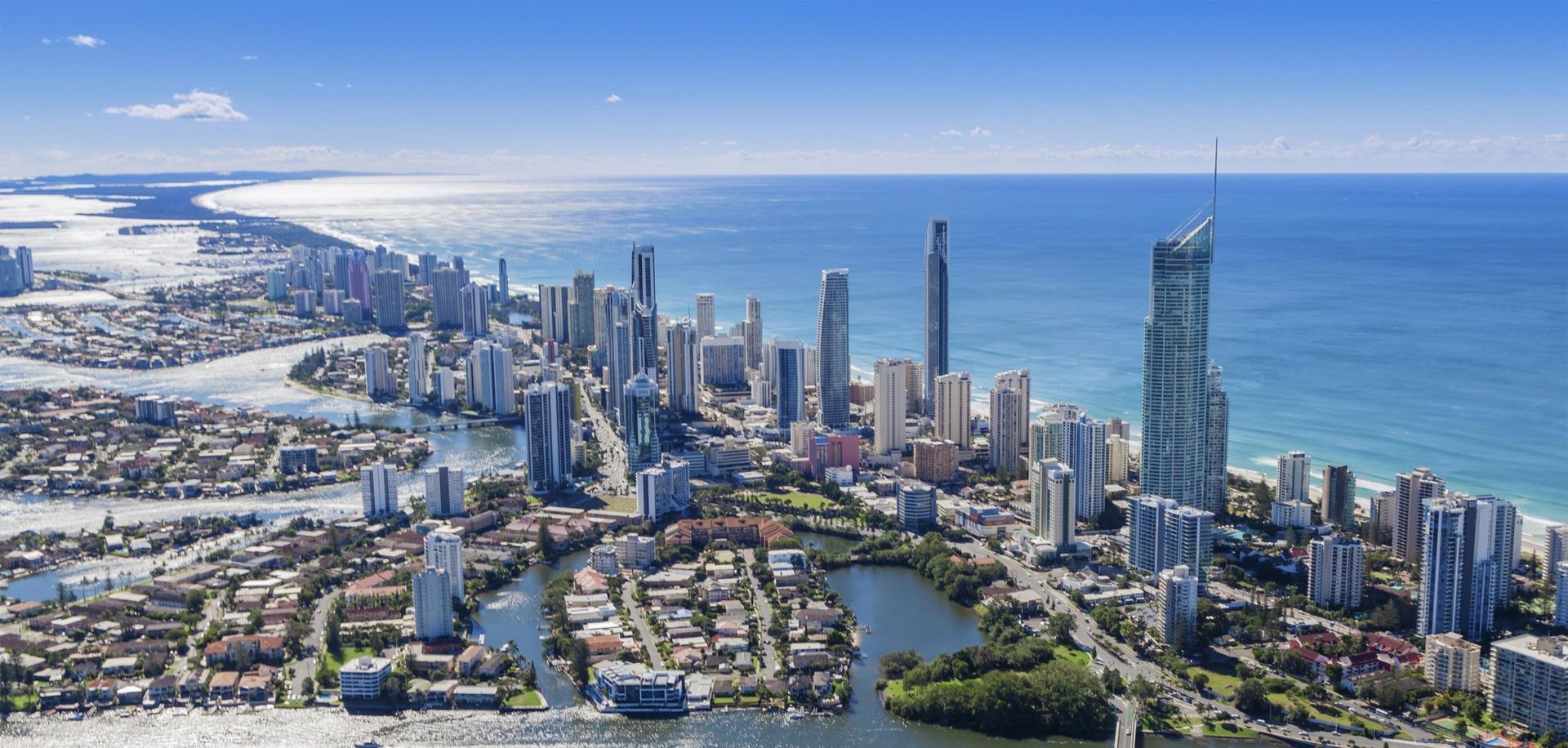
Overview of the Gold Coast
Geographic location and boundaries
The Gold Coast, a coastal city in Queensland, Australia, boasts an impressive 57-kilometer stretch of coastline. Nestled between the Pacific Ocean to the east and the Gold Coast Hinterland to the west, this vibrant city spans from Beenleigh and Russell Island in the north to the New South Wales border in the south. The unique geography of the Gold Coast contributes to its appeal as a tourist destination and residential area.
The city's eastern border, defined by its golden beaches, offers residents and visitors alike access to some of Australia's most beautiful coastal landscapes. To the west, the Gold Coast Hinterland provides a stark contrast with its lush rainforests and mountain ranges, creating a diverse ecological environment within the region.
Brief history and development
The Gold Coast's rich history dates back thousands of years, with the Yugambeh people being the original inhabitants of this land. European settlement began in the 1820s, marking the start of significant changes to the area's landscape and culture.
The transformation of the Gold Coast into the thriving city we know today began in the 1920s. During this period, it emerged as a popular tourist destination, attracting visitors with its pristine beaches and pleasant climate. The region's growing reputation as a sought-after holiday spot led to its official naming as the "Gold Coast" in 1958.
Since then, the Gold Coast has experienced rapid development, evolving from a small coastal town into a major urban center. The city has seen significant investment in infrastructure, real estate, and tourism facilities, cementing its position as one of Australia's premier holiday destinations and residential areas.
Population and demographics
As of 2021, the Gold Coast boasts a population of approximately 710,000 residents, making it the sixth-largest city in Australia. This substantial population growth reflects the city's appeal as both a tourist destination and a place to call home.
The demographics of the Gold Coast are diverse, contributing to its vibrant and multicultural community. The city attracts a mix of young families seeking a coastal lifestyle, retirees looking for a pleasant climate and relaxed atmosphere, and international students drawn to its educational institutions.
This demographic diversity has shaped the Gold Coast's culture, influencing everything from its culinary scene to its recreational activities. The city's population continues to grow, driven by both domestic and international migration, as people are drawn to its unique blend of urban amenities and natural beauty.
The Gold Coast's population is also characterized by its transient nature, with a significant influx of tourists and seasonal workers contributing to the city's dynamic atmosphere. This constant flow of people adds to the city's energetic vibe and contributes to its economy, particularly in the tourism and hospitality sectors.
The Gold Coast's diverse population, ranging from young families to retirees and international students, creates a unique and vibrant community that continues to shape the city's identity.
In conclusion, the Gold Coast's geographic location, rich history, and diverse population have combined to create a unique and appealing destination. Whether you're considering a visit or looking to make the Gold Coast your home, this introduction provides a glimpse into what makes this coastal city truly special.
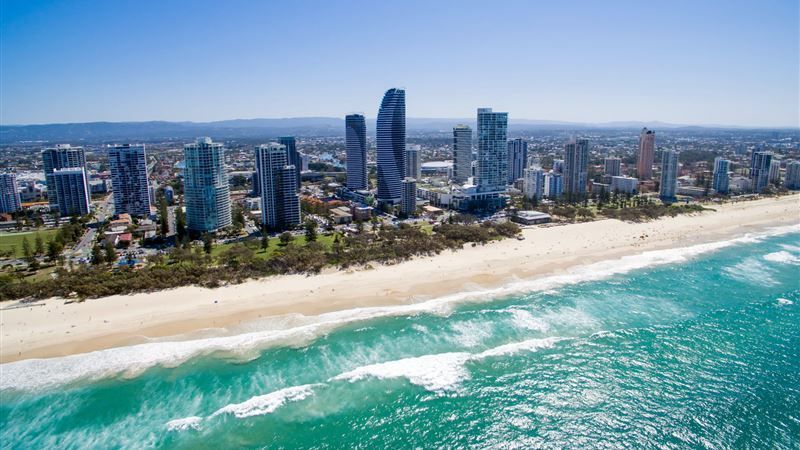
Natural Attractions
Iconic beaches and surfing spots
The Gold Coast is synonymous with sun-soaked beaches and world-class surfing. Stretching over 70 kilometers, the coastline offers a diverse array of beaches, each with its unique charm and appeal.
Surfers Paradise, the most famous beach in the region, lives up to its name with consistent waves and a bustling atmosphere. Its golden sand and crystal-clear waters draw millions of visitors annually, making it a quintessential Gold Coast experience.
Broadbeach, just south of Surfers Paradise, offers a more relaxed vibe while still providing excellent surf conditions. Its wide shoreline is perfect for sunbathing, picnicking, or enjoying a game of beach volleyball.
Burleigh Heads is a favorite among locals and tourists alike. Known for its picturesque headland and consistent surf break, it's a hotspot for experienced surfers. The adjacent Burleigh Head National Park offers scenic walks with stunning coastal views.
"The Gold Coast's beaches are not just about surfing; they're a way of life, offering something for everyone – from families to adventure seekers."
Hinterland rainforests and national parks
Beyond the glittering coastline lies the lush Gold Coast Hinterland, a stark contrast to the bustling beaches. This area is home to some of Australia's most beautiful rainforests and national parks.
Lamington National Park, a UNESCO World Heritage site, boasts ancient trees, stunning waterfalls, and over 160 kilometers of walking trails. The park is a haven for nature lovers and hikers, offering everything from short, easy walks to challenging full-day hikes.
Springbrook National Park is another gem in the hinterland crown. Known for its spectacular waterfalls, including the famous Purling Brook Falls, and the Natural Bridge rock formation, it provides visitors with breathtaking views and unique geological features.
Both parks are home to diverse flora and fauna, including rare and endangered species. Visitors might spot the elusive Albert's lyrebird or the colorful Richmond birdwing butterfly.
"The Gold Coast Hinterland offers a refreshing escape from the coastal buzz, immersing visitors in the tranquility of ancient rainforests."
Wildlife and marine life
The Gold Coast region is a biodiversity hotspot, supporting a wide array of native Australian wildlife both on land and in the sea.
On land, visitors can encounter iconic Australian animals in their natural habitats. Koalas can often be spotted in eucalyptus trees throughout the region, while kangaroos are commonly seen in open grasslands, particularly at dawn and dusk.
The area is a birdwatcher's paradise, home to over 350 bird species. From the vibrant rainbow lorikeets to the majestic wedge-tailed eagles, the diversity is truly remarkable.
The waters off the Gold Coast are equally teeming with life. Between June and November, humpback whales pass by during their annual migration, offering spectacular whale watching opportunities. Several tour operators provide boat trips to observe these magnificent creatures up close.
For those willing to dive beneath the waves, the Gold Coast offers excellent scuba diving and snorkeling experiences. The waters around Wave Break Island and Palm Beach Reef are particularly popular, hosting a variety of marine life including colorful tropical fish, sea turtles, and even leopard sharks.
"From the treetops to the ocean depths, the Gold Coast's wildlife offers visitors a chance to connect with nature and witness the incredible diversity of Australian fauna."
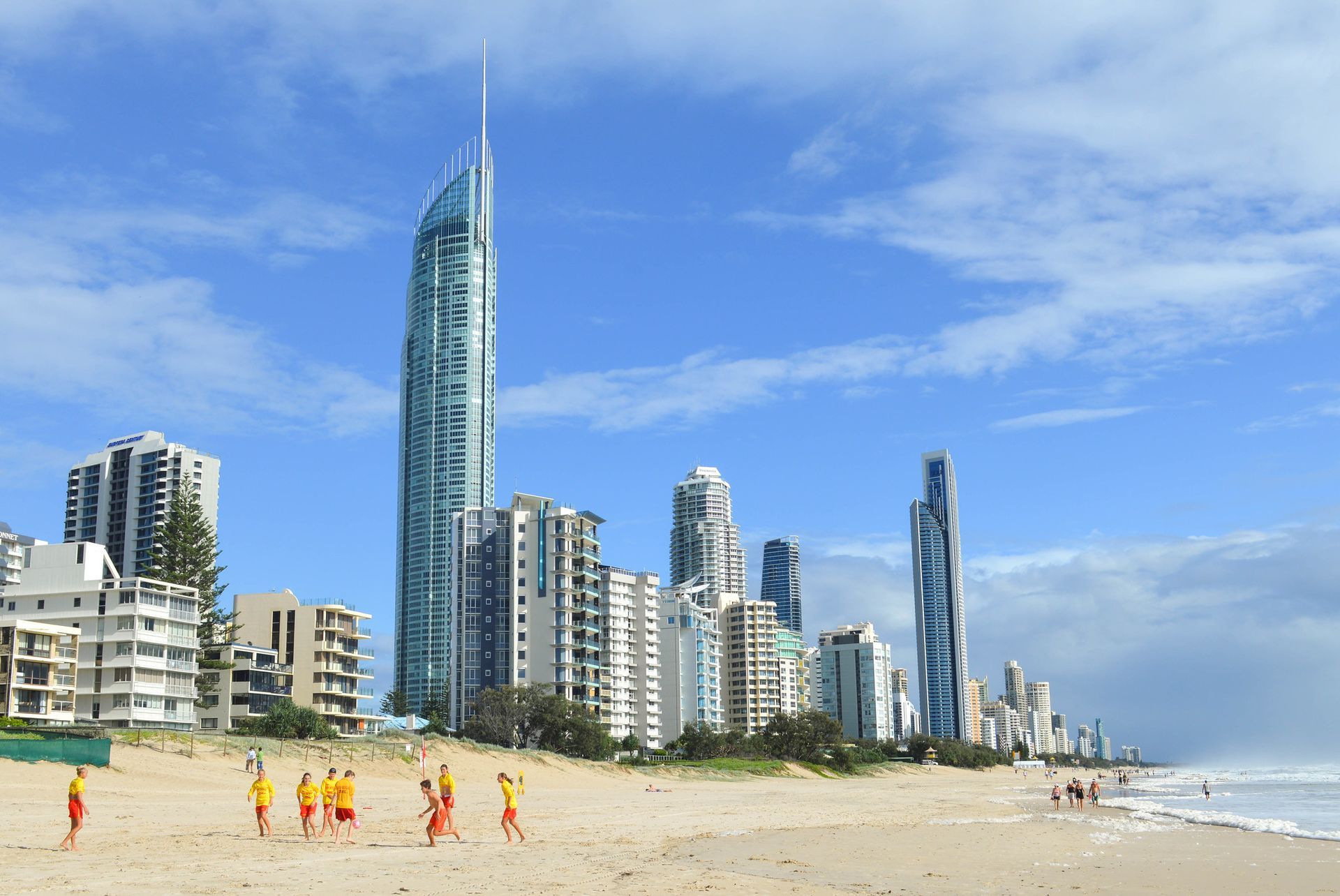
Urban Landscape and Architecture
The Gold Coast, a coastal city in Queensland, Australia, is renowned for its stunning beaches, vibrant lifestyle, and impressive urban landscape. This blog post explores the architectural marvels and urban planning strategies that have shaped the city's unique character.
Skyscrapers and modern cityscape
The Gold Coast skyline is a testament to modern architectural prowess, dominated by towering skyscrapers that create a striking silhouette against the azure sky. At the heart of this impressive cityscape stands the Q1 building, an architectural icon that reaches a height of 322.5 meters. As the tallest building in Australia, Q1 has become synonymous with the Gold Coast's identity.
The city's skyline is not just about height; it's a reflection of the Gold Coast's dynamic spirit and forward-thinking approach. The sleek glass facades and innovative designs of these structures showcase the city's commitment to modern aesthetics and functionality. From the Jewel towers with their crystalline appearance to the wave-inspired design of the Oracle buildings, each skyscraper contributes to the city's unique architectural narrative.
As someone who has witnessed the evolution of the Gold Coast skyline over the years, I can attest to the transformative impact these structures have had on the city's image. The view from the observation deck of Q1, which I had the pleasure of experiencing, offers a breathtaking panorama of the city and coastline, truly embodying the Gold Coast's blend of urban sophistication and natural beauty.
Residential areas and suburbs
The Gold Coast's residential landscape is as diverse as its population, offering a wide array of living options to suit various lifestyles and preferences. From luxurious beachfront apartments to family-friendly suburban homes, the city caters to a broad spectrum of residents and visitors.
Broadbeach, one of the most popular suburbs, is known for its high-rise apartments and vibrant atmosphere. The area boasts pristine beaches, world-class dining options, and excellent shopping facilities, making it a favorite among both locals and tourists. During my visits to Broadbeach, I've always been impressed by the seamless blend of residential comfort and urban excitement.
Southport, the central business district of the Gold Coast, offers a mix of modern apartments and heritage homes. This suburb is home to the Gold Coast's Chinatown and the popular Broadwater Parklands, providing residents with a unique blend of cultural experiences and recreational opportunities.
Robina, a master-planned community, represents suburban living at its finest. With its well-designed neighborhoods, extensive parklands, and the Robina Town Centre, this suburb offers a family-friendly environment without compromising on urban conveniences. I've found Robina to be particularly appealing for its balance of green spaces and modern amenities.
Each of these suburbs, along with many others in the Gold Coast, contributes to the city's diverse residential tapestry, catering to different lifestyles and preferences.
Urban planning and development
The Gold Coast's approach to urban planning is characterized by a commitment to sustainable growth and a keen awareness of the need to balance development with environmental conservation. This strategy has been crucial in maintaining the city's appeal as a tourist destination while ensuring a high quality of life for its residents.
Recent urban development projects have focused on improving public spaces, enhancing transportation networks, and upgrading community facilities. The Gold Coast Light Rail system, for instance, has significantly improved connectivity within the city, reducing traffic congestion and promoting sustainable transport options. As a frequent user of this system, I can vouch for its efficiency and the positive impact it has had on urban mobility.
The creation and enhancement of public spaces have been another key focus of urban planning initiatives. Projects like the revitalization of Southport's Broadwater Parklands have provided residents and visitors with beautiful green spaces for recreation and relaxation. These areas serve as community hubs, fostering social interaction and promoting outdoor activities.
Environmental conservation is also at the forefront of the Gold Coast's urban planning strategy. Efforts to protect and restore natural habitats, particularly along the coastline, have been integrated into development plans. The city's commitment to maintaining its famous beaches and protecting marine ecosystems demonstrates a long-term vision for sustainable urban growth.
In my opinion, the Gold Coast's approach to urban planning and development sets a commendable example for other growing cities. By prioritizing sustainability, community needs, and environmental conservation alongside economic development, the city is working towards a future that is both prosperous and livable.
The urban landscape and architecture of the Gold Coast reflect its identity as a modern, dynamic city that values both progress and sustainability. From its iconic skyscrapers to its diverse residential areas and thoughtful urban planning, the Gold Coast continues to evolve while maintaining its unique charm and natural beauty.
Economy and Industry
Tourism sector and its impact
The Gold Coast's tourism sector stands as a cornerstone of the local economy, significantly contributing to employment and revenue generation. Each year, the city welcomes millions of visitors from both domestic and international markets, drawn by its pristine beaches, theme parks, and vibrant atmosphere.
Tourism on the Gold Coast directly supports numerous jobs across various industries, including hospitality, retail, and transportation. Hotels, restaurants, and attractions employ a substantial workforce to cater to the influx of visitors. This employment ripple effect extends to indirect jobs in sectors such as food suppliers, maintenance services, and marketing agencies.
The economic impact of tourism extends beyond job creation. Visitors inject substantial funds into the local economy through accommodation bookings, dining experiences, retail purchases, and attraction visits. This influx of capital supports local businesses and contributes to the city's overall economic growth.
In 2019, before the COVID-19 pandemic, the Gold Coast welcomed over 14 million visitors, who collectively spent approximately $5.9 billion in the region.
While tourism brings economic benefits, it also presents challenges. The industry's seasonal nature can lead to fluctuations in employment and income. Additionally, over-reliance on tourism can make the local economy vulnerable to external factors such as global economic downturns or health crises.
Real estate and construction
The real estate and construction industries play a vital role in shaping the Gold Coast's economic landscape. These sectors contribute significantly to local employment, attract investment, and drive infrastructure development.
The Gold Coast's real estate market has experienced steady growth over the years, fueled by factors such as population increase, lifestyle appeal, and investment opportunities. The city's skyline continues to evolve with new residential and commercial developments, reflecting the ongoing demand for property.
Key aspects of the real estate and construction sectors include:
- Residential development: From high-rise apartments to suburban housing estates, residential construction remains a major driver of economic activity.
- Commercial properties: Office spaces, retail centers, and industrial facilities support business growth and attract investment.
- Infrastructure projects: Road expansions, public transport improvements, and community facilities contribute to the city's development and create jobs.
The construction industry, closely tied to real estate, provides employment opportunities for a wide range of professionals, including architects, engineers, tradespeople, and laborers. This sector also supports ancillary businesses such as building material suppliers and equipment rental companies.
While these industries bring economic benefits, they also face challenges. These include managing sustainable growth, addressing housing affordability concerns, and adapting to changing market conditions.
Education and research institutions
The Gold Coast has established itself as an education hub, home to several universities and research institutions that contribute significantly to the city's knowledge economy. These institutions not only provide quality education but also drive innovation, attract international students, and contribute to the local workforce.
Notable institutions:
- Griffith University: With multiple campuses on the Gold Coast, Griffith University offers a wide range of programs and is known for its research in areas such as health, environmental science, and business.
- Bond University: Australia's first private non-profit university, Bond is recognized for its small class sizes and accelerated degree programs.
- Southern Cross University: Its Gold Coast campus specializes in allied health, nursing, and business programs.
These institutions play a crucial role in the local economy:
- Employment: Universities and research centers provide jobs for academic staff, researchers, and administrative personnel.
- Student spending: Domestic and international students contribute to the local economy through living expenses, entertainment, and retail purchases.
- Research and innovation: Collaborations between academia and industry drive innovation and can lead to commercialization of new technologies.
- Skill development: These institutions help develop a skilled workforce, aligning with the needs of local industries.
The education sector also faces its own set of challenges, including adapting to changing educational technologies, maintaining international student enrollments, and ensuring graduates are job-ready in a rapidly evolving employment landscape.
In 2019, international education contributed approximately $1.7 billion to the Gold Coast economy, highlighting its significance as an export industry.
The presence of these educational and research institutions not only enhances the Gold Coast's reputation as a knowledge city but also contributes to its cultural diversity and global connections.
Culture and Entertainment
Theme parks and attractions
The Gold Coast has earned its reputation as a premier destination for thrill-seekers and families alike, thanks to its world-class theme parks. Dreamworld, Movie World, and Sea World stand out as the crown jewels of the city's entertainment offerings, drawing millions of visitors each year.
Dreamworld, Australia's largest theme park, offers a diverse range of attractions, from heart-pounding roller coasters to wildlife experiences. Movie World brings the magic of cinema to life with movie-themed rides and live shows. Sea World combines marine life education with exciting rides and shows, making it a unique blend of entertainment and conservation.
These parks not only provide endless fun for visitors but also contribute significantly to the local economy. They employ thousands of locals and drive tourism, helping to establish the Gold Coast as a must-visit destination in Australia.
"The theme parks of the Gold Coast are more than just attractions; they're a vital part of the city's identity and economy."
Arts and cultural scene
While the Gold Coast is often associated with its beaches and theme parks, the city has been steadily developing a rich arts and cultural scene. At the forefront of this cultural renaissance is the Home of the Arts (HOTA), a state-of-the-art facility that has become the beating heart of the city's creative community.
HOTA hosts a wide array of events, from contemporary art exhibitions to live music performances and theatrical productions. The venue's diverse programming attracts both local and international artists, providing Gold Coast residents and visitors with access to world-class cultural experiences.
Beyond HOTA, the Gold Coast boasts numerous galleries and museums that showcase the talent of local artists and bring international exhibitions to the city. The Gold Coast City Gallery, for instance, houses a significant collection of contemporary and indigenous Australian art.
This burgeoning arts scene is changing perceptions of the Gold Coast, adding depth and sophistication to its image as a tourist destination.
Festivals and events
The Gold Coast's calendar is packed with festivals and events that cater to a wide range of interests and age groups. These events not only entertain locals and tourists but also showcase the city's cultural diversity and creative spirit.
The Gold Coast Film Festival has become a highlight of the city's cultural calendar. This annual event celebrates the art of cinema, featuring screenings of local and international films, workshops, and industry events. It has played a crucial role in fostering the local film industry and attracting filmmakers from around the world.
Blues on Broadbeach is another much-anticipated event that transforms the streets of Broadbeach into a music lover's paradise. This free music festival features both Australian and international blues artists, creating a vibrant atmosphere that locals and visitors eagerly look forward to each year.
Perhaps the most famous event associated with the Gold Coast is Schoolies Week. This annual celebration marks the end of high school for Australian students and has become synonymous with the Gold Coast. While it presents challenges in terms of crowd management and safety, it also brings significant economic benefits to the city.
These events, along with many others throughout the year, contribute to the Gold Coast's reputation as a dynamic and exciting destination. They provide entertainment for residents, attract tourists, and create opportunities for local businesses.
"From film festivals to music events and youth celebrations, the Gold Coast's diverse event calendar reflects the city's vibrant and inclusive culture."
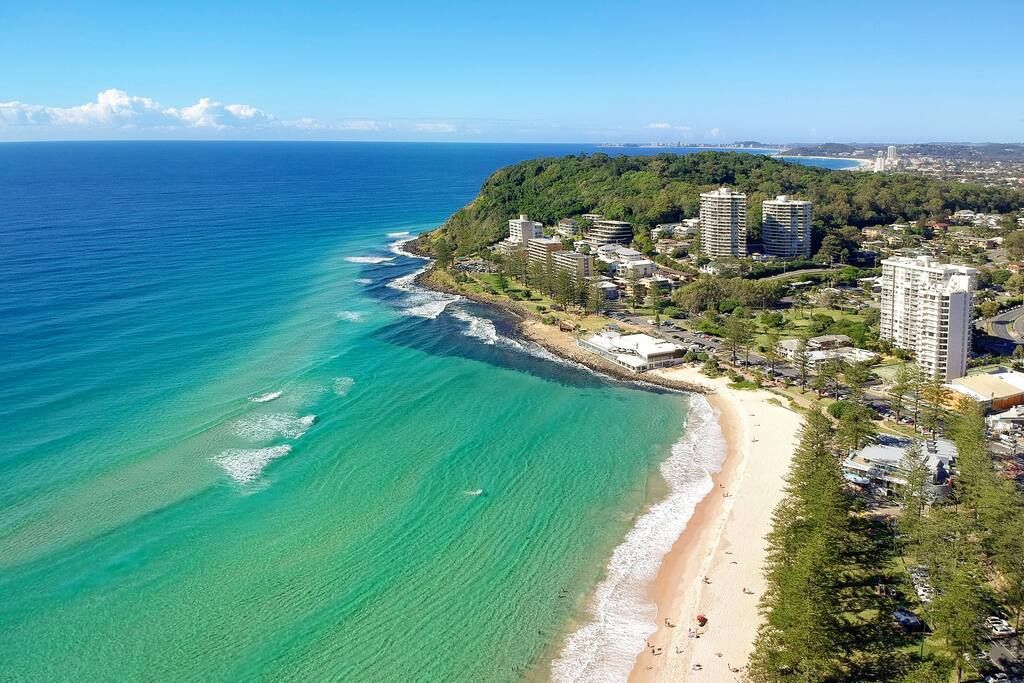
Lifestyle and Recreation
Outdoor activities and sports
The Gold Coast's favorable climate and stunning natural environment create an ideal setting for a wide range of outdoor activities. Residents and visitors alike can enjoy numerous pursuits that take advantage of the region's beautiful beaches, lush hinterland, and well-maintained recreational facilities.
Surfing stands out as one of the most popular activities on the Gold Coast. With over 70 kilometers of coastline and world-renowned surf breaks like Snapper Rocks and Burleigh Heads, the area attracts surf enthusiasts from around the globe. For those new to the sport, numerous surf schools offer lessons for beginners.
Swimming is another favorite pastime, with the Gold Coast's pristine beaches providing safe and enjoyable spots for a refreshing dip. Many beaches are patrolled by lifeguards, ensuring a secure environment for swimmers of all ages and abilities.
Cycling enthusiasts can explore the extensive network of bike paths that wind through the city and along the coastline. The Gold Coast Oceanway, a 36-kilometer pathway stretching from the Spit to Point Danger, offers cyclists stunning ocean views and access to various beaches and parks.
Golf is also a significant attraction in the region, with over 40 golf courses catering to players of all skill levels. Notable courses include the Royal Pines Resort, host to the Australian PGA Championship, and the scenic Sanctuary Cove Golf and Country Club.
Other popular outdoor activities include:
- Hiking in the Gold Coast Hinterland
- Stand-up paddleboarding in the calm waters of Tallebudgera Creek
- Kayaking through the Currumbin Estuary
- Rock climbing at Mount Tamborine
Shopping and dining experiences
The Gold Coast offers a diverse array of shopping and dining options, catering to various tastes and budgets. From large shopping centers to quaint boutique markets, visitors and residents can enjoy a range of retail experiences.
Pacific Fair, one of the largest shopping centers in Australia, boasts over 400 stores, including international fashion brands, local boutiques, and department stores. The center's recent redevelopment has transformed it into a premier shopping destination, complete with high-end designer outlets and a range of dining options.
For those seeking a more unique shopping experience, the Gold Coast is home to several markets. The Carrara Markets, held every weekend, is the largest permanent marketplace in Australia, offering fresh produce, handmade crafts, and vintage finds. The Miami Marketta, a night market held on Wednesday, Friday, and Saturday evenings, combines street food, live music, and artisanal products for a vibrant community atmosphere.
The Gold Coast's culinary scene is equally varied, with options ranging from casual beachside cafes to fine dining restaurants. Burleigh Heads has emerged as a foodie hotspot, with establishments like Rick Shores and The Fish House offering sophisticated dining experiences with ocean views.
For a more relaxed meal, visitors can explore the numerous cafes along the coastline. Many of these eateries focus on fresh, locally-sourced ingredients and offer healthy options to cater to the Gold Coast's fitness-oriented lifestyle.
The city also boasts a growing craft beer scene, with several local breweries gaining popularity. Burleigh Brewing Co. and Black Hops Brewing are just two examples of successful local enterprises that offer brewery tours and tasting experiences.
Nightlife and entertainment venues
The Gold Coast is renowned for its vibrant nightlife, with areas like Surfers Paradise and Broadbeach serving as hubs for evening entertainment. These precincts offer a diverse range of venues catering to different tastes and age groups.
Surfers Paradise, the most famous nightlife destination on the Gold Coast, is home to numerous bars, clubs, and live music venues. Establishments like Elsewhere and Sin City cater to those seeking a high-energy clubbing experience, while bars like The Avenue and Steampunk offer more relaxed environments for socializing.
Broadbeach has developed a reputation for its sophisticated nightlife options. The Star Gold Coast casino complex is a major attraction, offering gaming facilities, bars, and restaurants. Nearby, the Broadbeach Mall comes alive in the evening with street performers and alfresco dining options.
Live music enthusiasts can find various venues showcasing local and international talent. The Miami Shark Bar and Soundlounge in Currumbin are popular spots for catching up-and-coming bands, while larger venues like the Gold Coast Convention and Exhibition Centre host major touring acts.
For those seeking cultural experiences, the Home of the Arts (HOTA) precinct offers a diverse program of theater, dance, and music performances. The outdoor stage hosts regular concerts and cinema screenings, providing entertainment in a picturesque setting.
Comedy clubs, such as Laugh Your Pants Off in Surfers Paradise, offer regular stand-up nights featuring both local and touring comedians. These venues provide a different form of evening entertainment for those looking for laughs rather than loud music.
The Gold Coast's nightlife also extends to its rooftop bars, which have become increasingly popular in recent years. Venues like The Island Rooftop in Surfers Paradise and Justin Lane Rooftop in Burleigh Heads offer stunning views of the city skyline and coastline, providing a perfect backdrop for evening drinks and socializing.
Transportation and Infrastructure
Road networks and public transport
The Gold Coast boasts a well-developed road network that facilitates efficient movement throughout the city and beyond. The Pacific Motorway, a major artery, connects the Gold Coast to Brisbane in the north and New South Wales in the south. This highway plays a crucial role in regional connectivity and economic development.
Public transport options in the Gold Coast are diverse and continuously improving. The bus network covers extensive areas of the city, providing reliable service to residents and visitors alike. Timetables are designed to cater to peak hours and popular destinations, ensuring accessibility for commuters and tourists.
The G:link light rail system, introduced in 2014, has become an integral part of the city's public transport infrastructure. This modern transit option connects key areas such as Surfers Paradise, Broadbeach, and the Gold Coast University Hospital. The G:link has not only improved mobility within the city but also reduced traffic congestion and parking issues in popular areas.
The G:link light rail system carries an average of 21,000 passengers daily, showcasing its importance in the city's transport ecosystem.
Gold Coast Airport
Gold Coast Airport, situated in Coolangatta, serves as a vital gateway for both domestic and international travelers. The airport's strategic location, straddling the Queensland and New South Wales border, makes it a unique and important transportation hub.
In recent years, Gold Coast Airport has undergone significant growth and upgrades to meet increasing passenger demands. These improvements include:
- Expansion of the terminal building
- Addition of new airline lounges
- Implementation of advanced security screening technology
- Increase in the number of aircraft parking bays
The airport's growth has been closely tied to the city's tourism industry and population expansion. It now handles millions of passengers annually, with direct flights to various domestic destinations and international locations in Asia and New Zealand.
Future infrastructure projects
The Gold Coast is committed to continuous improvement of its infrastructure to support the city's growth and enhance quality of life for residents and visitors. Several ongoing and planned projects aim to achieve these goals:
Light Rail System Expansion
The G:link light rail system is set for further expansion. Stage 3 of the project will extend the line south to Burleigh Heads, improving connectivity along the coastal strip. Future stages may potentially reach the Gold Coast Airport, creating a seamless connection between air and rail transport.
Road Network Upgrades
Major road upgrades are in the pipeline to ease congestion and improve traffic flow. These include:
- Widening of key sections of the M1 Pacific Motorway
- Improvements to major arterial roads
- Implementation of smart traffic management systems
Public Facilities Enhancement
The city is investing in the upgrade and development of various public facilities to cater to the growing population and visitor numbers. These projects include:
- Modernization of community centers
- Expansion of public libraries
- Creation of new parks and recreational spaces
These infrastructure projects demonstrate the Gold Coast's commitment to creating a well-connected, efficient, and livable city. As these developments progress, they will continue to shape the Gold Coast's urban landscape and support its position as a major Australian city and tourist destination.
Environmental Challenges and Sustainability
Coastal erosion and management
The Gold Coast's stunning beaches are not only a major tourist attraction but also a crucial part of the local ecosystem. However, these natural wonders face a significant threat: coastal erosion. This process, driven by wind, waves, and currents, gradually wears away the coastline, potentially leading to the loss of beaches and damage to coastal infrastructure.
To combat this issue, the Gold Coast City Council has implemented several strategies:
- Beach nourishment programs: These involve adding sand to eroded areas, effectively widening the beach and creating a buffer against future erosion.
- Artificial reef construction: Submerged structures are built offshore to reduce wave energy and trap sand, helping to stabilize the coastline.
- Seawalls and groynes: These structures are designed to protect the shoreline and retain sand, though their use is carefully considered due to potential impacts on natural coastal processes.
While these measures have shown some success, the challenge of coastal erosion remains ongoing, requiring constant monitoring and adaptive management.
Climate change impacts
Like many coastal regions worldwide, the Gold Coast faces significant challenges due to climate change. The potential impacts include:
- Sea-level rise: This could lead to increased coastal flooding and erosion, threatening low-lying areas and infrastructure.
- Extreme weather events: More frequent and intense storms, cyclones, and heatwaves could pose risks to public safety and property.
- Biodiversity loss: Changing temperatures and rainfall patterns may affect local ecosystems and wildlife.
In response, the Gold Coast City Council has developed a Climate Change Strategy. This comprehensive plan includes:
- Adaptation measures: Improving flood defenses, updating building codes, and enhancing emergency response systems.
- Mitigation efforts: Promoting renewable energy, improving energy efficiency in buildings, and encouraging sustainable transport options.
- Community engagement: Educating residents about climate risks and involving them in sustainability initiatives.
These strategies aim to build resilience and reduce the city's carbon footprint, helping to secure a sustainable future for the Gold Coast.
Conservation efforts and initiatives
Preserving the Gold Coast's natural environment is crucial for both ecological and economic reasons. Several conservation initiatives are currently underway:
- Habitat restoration: Projects such as the Coomera River Rehabilitation Program aim to restore degraded ecosystems and improve water quality.
- Wildlife protection: The Koala Conservation Plan works to protect and expand koala habitats, while marine conservation efforts focus on protecting sea turtles and other marine life.
- Sustainable practices: The city is promoting waste reduction, recycling, and water conservation among residents and businesses.
- Urban greening: Initiatives to increase tree cover and create green spaces in urban areas help combat the heat island effect and improve air quality.
These efforts demonstrate the Gold Coast's commitment to balancing urban development with environmental preservation, ensuring that future generations can continue to enjoy the region's natural beauty.
Summary
The Gold Coast is a unique destination that offers a rare combination of natural splendor, urban sophistication, and cultural diversity. While the city faces challenges related to rapid growth and environmental pressures, it continues to adapt and evolve. Through innovative urban planning, environmental management, and a commitment to sustainability, the Gold Coast is working to preserve its natural assets while providing a high quality of life for residents and a memorable experience for visitors.
The city's ability to balance development with conservation, manage environmental challenges, and maintain its vibrant character will be crucial in shaping its future. As the Gold Coast continues to grow and change, it remains a testament to the potential for harmonious coexistence between human activity and natural beauty.
FAQs about the Gold Coast
1. What is the best time to visit the Gold Coast?
The Gold Coast enjoys a subtropical climate with pleasant weather year-round. However, the best time to visit depends on your preferences:
- Summer (December to February): Ideal for beach activities but can be hot and humid with occasional rainfall.
- Autumn (March to May): Mild temperatures and less rainfall make this a great time for outdoor activities.
- Winter (June to August): Cooler and drier, perfect for hiking and exploring the hinterland.
- Spring (September to November): Warm days and cool nights, with lower humidity than summer.
2. How can I get around the Gold Coast without a car?
The Gold Coast offers several public transportation options:
- G:link light rail system: Connects major areas like Surfers Paradise, Broadbeach, and Southport.
- Buses: An extensive network covers most parts of the city.
- Cycling: The city has numerous bike paths and a bike-share program.
- Walking: Many popular areas are pedestrian-friendly.
- Rideshare and taxi services are also readily available.
3. What are some free activities to do on the Gold Coast?
The Gold Coast offers many free attractions and activities:
- Beach visits: Enjoy the city's famous beaches at no cost.
- Hinterland walks: Explore scenic trails in national parks.
- Markets: Visit local markets like the Surfers Paradise Beachfront Markets.
- Art galleries: Many local galleries offer free entry.
- Public parks: Enjoy facilities in parks like the Broadwater Parklands.
4. Is the Gold Coast a good place to live?
The Gold Coast is generally considered a desirable place to live, offering:
- Beautiful natural environment
- Diverse job opportunities, particularly in tourism and healthcare
- High-quality education institutions
- Wide range of recreational activities
- Good climate
However, like any city, it has challenges such as traffic congestion during peak tourist seasons and a relatively high cost of living in some areas.
5. What are the most popular beaches on the Gold Coast?
Some of the Gold Coast's most popular beaches include:
- Surfers Paradise: The most famous, known for its vibrant atmosphere
- Burleigh Heads: Popular for surfing and its scenic headland
- Coolangatta: A quieter option with excellent swimming conditions
- Main Beach: Close to Sea World and the Spit
- Broadbeach: Known for its nearby dining and shopping options
Each beach has its own character and attractions, catering to different preferences and activities.




